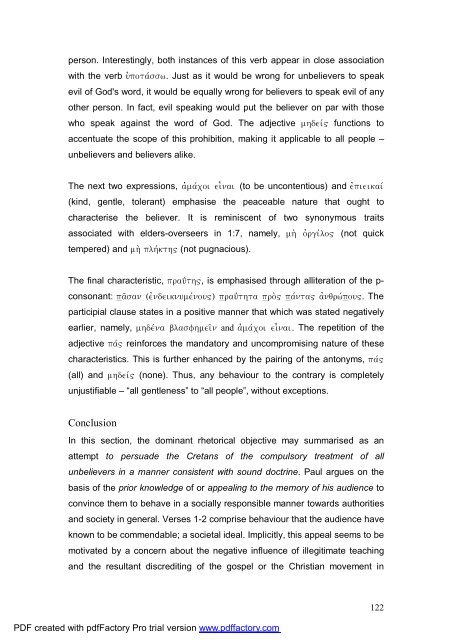A Text centred rhetorical analysis of Paul's Letter to Titus
A Text centred rhetorical analysis of Paul's Letter to Titus
A Text centred rhetorical analysis of Paul's Letter to Titus
You also want an ePaper? Increase the reach of your titles
YUMPU automatically turns print PDFs into web optimized ePapers that Google loves.
person. Interestingly, both instances <strong>of</strong> this verb appear in close association<br />
with the verb uJpotavssw. Just as it would be wrong for unbelievers <strong>to</strong> speak<br />
evil <strong>of</strong> God's word, it would be equally wrong for believers <strong>to</strong> speak evil <strong>of</strong> any<br />
other person. In fact, evil speaking would put the believer on par with those<br />
who speak against the word <strong>of</strong> God. The adjective mhdeiv~ functions <strong>to</strong><br />
accentuate the scope <strong>of</strong> this prohibition, making it applicable <strong>to</strong> all people –<br />
unbelievers and believers alike.<br />
The next two expressions, ajmavcoi ei\nai (<strong>to</strong> be uncontentious) and ejpieikaiv<br />
(kind, gentle, <strong>to</strong>lerant) emphasise the peaceable nature that ought <strong>to</strong><br />
characterise the believer. It is reminiscent <strong>of</strong> two synonymous traits<br />
associated with elders-overseers in 1:7, namely, mh; ojrgivlo" (not quick<br />
tempered) and mh; plhvkth" (not pugnacious).<br />
The final characteristic, prau?th~, is emphasised through alliteration <strong>of</strong> the p-<br />
consonant: pa`san (ejndeiknumevnou") prau?thta pro;" pavnta" ajnqrwvpou". The<br />
participial clause states in a positive manner that which was stated negatively<br />
earlier, namely, mhdevna blasfhmei`n and ajmavcoi ei\nai. The repetition <strong>of</strong> the<br />
adjective pav~ reinforces the manda<strong>to</strong>ry and uncompromising nature <strong>of</strong> these<br />
characteristics. This is further enhanced by the pairing <strong>of</strong> the an<strong>to</strong>nyms, pav~<br />
(all) and mhdeiv~ (none). Thus, any behaviour <strong>to</strong> the contrary is completely<br />
unjustifiable – “all gentleness” <strong>to</strong> “all people”, without exceptions.<br />
Conclusion<br />
In this section, the dominant <strong>rhe<strong>to</strong>rical</strong> objective may summarised as an<br />
attempt <strong>to</strong> persuade the Cretans <strong>of</strong> the compulsory treatment <strong>of</strong> all<br />
unbelievers in a manner consistent with sound doctrine. Paul argues on the<br />
basis <strong>of</strong> the prior knowledge <strong>of</strong> or appealing <strong>to</strong> the memory <strong>of</strong> his audience <strong>to</strong><br />
convince them <strong>to</strong> behave in a socially responsible manner <strong>to</strong>wards authorities<br />
and society in general. Verses 1-2 comprise behaviour that the audience have<br />
known <strong>to</strong> be commendable; a societal ideal. Implicitly, this appeal seems <strong>to</strong> be<br />
motivated by a concern about the negative influence <strong>of</strong> illegitimate teaching<br />
and the resultant discrediting <strong>of</strong> the gospel or the Christian movement in<br />
PDF created with pdfFac<strong>to</strong>ry Pro trial version www.pdffac<strong>to</strong>ry.com<br />
122

















